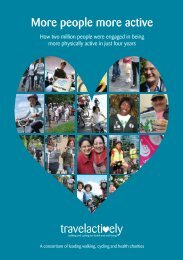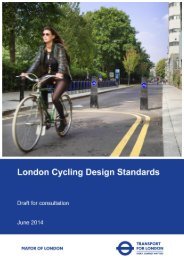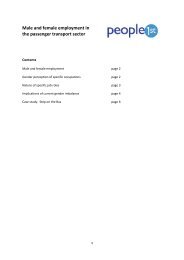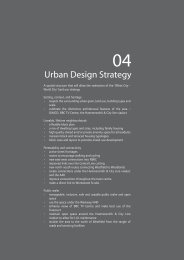Travel in London Travel in London
travel-in-london-report-8
travel-in-london-report-8
Create successful ePaper yourself
Turn your PDF publications into a flip-book with our unique Google optimized e-Paper software.
10. The <strong>London</strong> 2012 Games and their legacy – an update<br />
Dur<strong>in</strong>g the Games:<br />
• <strong>London</strong>’s public transport networks carried record numbers of people. On the<br />
roads, while traffic was reduced <strong>in</strong> central and <strong>in</strong>ner <strong>London</strong>, <strong>in</strong> outer <strong>London</strong><br />
traffic levels were comparable to those normally expected dur<strong>in</strong>g the summer<br />
holiday period.<br />
• TfL calculated that background (ie non-Games) travel reduced by about 5 per<br />
cent dur<strong>in</strong>g the Olympics, and by about 3 per cent dur<strong>in</strong>g the Paralympics,<br />
compared to what would normally be expected at those times of year. This<br />
provided a degree of headroom to accommodate overall demand (<strong>in</strong>clud<strong>in</strong>g<br />
both Games and non-Games demand) that was estimated to be 5.5 per cent<br />
(Olympics) and 3.9 per cent (Paralympics) higher than would otherwise have<br />
been expected at that time of the year.<br />
• It was estimated that more than 95 per cent of Games related trips used public<br />
transport, and the evidence suggested that the public response to the TDM<br />
messages was almost optimally targeted <strong>in</strong> terms of time and location.<br />
• The transport networks performed very well <strong>in</strong> operational terms with no major<br />
issues. Reliability for Games Family journeys by road exceeded the 95 per cent<br />
target set by the International Olympic Commission, and journey time reliability<br />
on the roads for other traffic was similar to that usually delivered.<br />
• Reliability levels for the ma<strong>in</strong> public transport networks were comparable to, or<br />
exceeded, the high levels of operational reliability now rout<strong>in</strong>ely delivered.<br />
Ma<strong>in</strong> lessons learned from the 2012 Games<br />
A comb<strong>in</strong>ation of several factors made the Games a transport success. Among the<br />
most significant were:<br />
• An <strong>in</strong>tegrated transport system – TfL’s unique breadth of responsibilities,<br />
unique for a host city, plus measures such as the <strong>London</strong> spectator <strong>Travel</strong>card,<br />
multi-agency co-ord<strong>in</strong>ated operations and customer communications all helped<br />
to greatly improve the traveller experience.<br />
• Outstand<strong>in</strong>g levels of operational performance – transport reliability dur<strong>in</strong>g the<br />
Games was strong, at 98 per cent or more on the Tube, DLR and <strong>London</strong><br />
Overground, cont<strong>in</strong>u<strong>in</strong>g the improv<strong>in</strong>g performance of recent periods, and<br />
reflect<strong>in</strong>g enhanced ma<strong>in</strong>tenance and other measures for Games time,<br />
• Exceptional customer experience – with extra staff and volunteers, eye-catch<strong>in</strong>g<br />
magenta signage, and <strong>in</strong>tegrated real-time customer <strong>in</strong>formation, transport<br />
operators provided an exceptional customer experience for spectators, Games<br />
Family and regular travellers over the summer.<br />
• Effective management of the road network – TfL balanced the needs of the<br />
Games Family and regular road users effectively, through active traffic<br />
management, the design of robust Olympic and Paralympic Route Networks,<br />
and by open<strong>in</strong>g Games lanes (for Games Family vehicles only) to normal traffic<br />
when they were not needed.<br />
• Successful communication strategy and travel demand management (TDM) -<br />
with an <strong>in</strong>tegrated communications and TDM strategy, travellers were <strong>in</strong>formed<br />
<strong>in</strong> real-time about the best ways to use the transport system, and by follow<strong>in</strong>g<br />
advice to avoid the busiest times and places to keep the transport system<br />
mov<strong>in</strong>g despite record passenger numbers.<br />
187 <strong>Travel</strong> <strong>in</strong> <strong>London</strong>, Report 8








